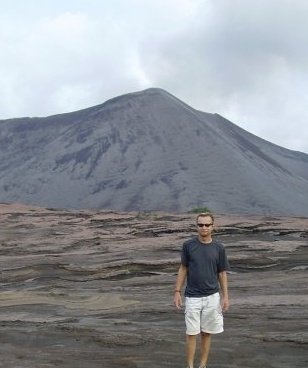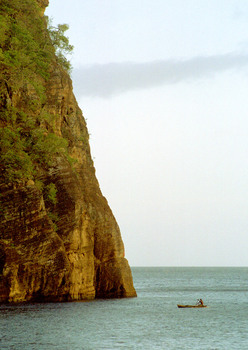I have a bone to pick with you.
I’ve lived with this for a while now, but really, it’s getting intolerable. The vast majority of you are using the computer equivalent of a Ford Pinto. Poorly built, underpowered and yet inefficient, lacking both in style and substance. And unsafe at any speed.
 Worse still, you’re not even driving it.
Worse still, you’re not even driving it.
Back in 2007, Vint Cerf, one of the inventors of the Internet, stood up at the Davos Forum and announced that, out of about 600 million personal computers worldwide, about 150 million are remotely controlled by criminals. These ‘zombies’ or ‘bots’, as they’re commonly known, are formed into legions of compromised machines called ‘botnets’.
Let’s put this in perspective: If your own PC is not infected, then odds are very high that one of your next-door neighbours’ is. When you factor in the strict security and controls that many enterprises maintain on their corporate resources, the odds that your home PC (and your neighbour’s) is a bot increase significantly.
Next time you’re having a coffee and using the wifi service, take a look around. Count the number of non-Mac laptops. Divide by 4. That’s how many computers are trying to infect you on the very network you’re using to buy stuff. You wouldn’t jump into a hot tub with a bunch of strangers even at better odds than that. Why do it with your laptop?
The Pinto is notorious for actually blowing up if you bumped into it in a certain way. Botnets currently aren’t doing as much damage as that. They could, but they don’t. Simply put, their controllers would rather use them than lose them. They are quite happy to pollute the Internet with spam, viruses and other nasties, but they’d much rather steal your credit card number than your Internet access.
To switch analogies, it’s like some dark overlord deciding to postpone the zombie Apocalypse, using his legions to pick pockets and snatch purses instead.
Why am I so upset? Why should I care if most people cruise the Internet in the equivalent of a polluting, gas-guzzling, style-less lemon? Because you’re not only destroying my view, you’re damaging the road itself.
According to a recent report, 40% of the world’s spam is being generated by a single botnet. The botnet, named Rustock, comprises approximately 1.3 million individual PCs. This one botnet, in other words, has enlisted the services of almost the same number of people as there are in the US Military. Their combined efforts result in about 46 billion spam messages a day.
46 billion-with-a-B spam messages. Every day. From one botnet alone.
Take a look at this graph. See those peaks and valleys? Notice how they match perfectly the pattern of people turning on their computers in the morning and off again later at night? See the lull over the weekend? This graph tracks spam activity over the course of a normal week on just one spam trap operated by some people who run an anti-spam operation.
They say:
The Y [vertical] axis is emails per second. “5.0k” means 5000 emails/second. For each 1000 emails/second this trap averages over a day, the total is another 86 million emails/day. For example, a 5000 emails/second average over a day represents 432 million emails per day.
Botnets are used for other nefarious purposes, but spam is the most noticeable. The Rustock botnet mentioned above sends mostly pharmaceutical spam, offering to sell dangerous, controlled substances, among other things.
But even if they were flooding the Net with messages of love and hope, botnets would still be a menace. Imagine if every time you drove on the freeway, 1 in 4 fellow commuters’ vehicle would blow a gasket, slow down to a fraction of the speed limit, start making an infernal noise and spew smoke so thick that you had no choice but to slow down to a crawl.
That’s what’s happening, but you can’t see it. The computer industry has responded to this threat by selling the moral equivalent of frosted windows. Email providers have become so good at hiding spam that only a tiny fraction of it ever appears in your mail box. So, I can hear you say, where’s the problem, then? Spam created; spam deleted. Problem solved.
Not quite. That spam chews up a tremendous amount of bandwidth and processor time. Bandwidth you pay for. Don’t imagine that your ISP is going to say, “Oh, that’s just spam, our beloved customer didn’t actually mean to send that message 14,000 times. Let’s not charge him for those megabytes.”
Billions of dollars are spent on software and hardware to treat the symptom without once addressing the cure. Your PC runs slower and costs more because of the antivirus that comes installed on it. And even that isn’t nearly adequate to protect you.
To be clear: The Pinto in this picture is the Windows XP operating system. I’m going to apply some precise technical terminology here, so pay close attention:
Windows XP Security Sucks The Hind Teat of a Scrofulous Cow.
Some argue that once there are as many Macs (or Linux machines, or iPads, or Android phones) on the market, they’ll be just as beset by malicious software as Windows. Theoretically, that’s possible. In the real world, however, the opposite is true.
In the realm of computer servers, Linux-based operating systems are taking a dominant position. Yet when it comes to the number of servers compromised by malicious software, they represent a vanishingly small fraction of the cases.
Despite the recent proliferation of Macs, linux-based netbooks, tablets and smart phones, none has yet to show any significant signs of affliction. That’s not to say it won’t happen, but it hasn’t yet.
Do yourself a favour. Do us all a favour. Stop using Windows. Buy a Mac. Try Linux. Do something, anything, but stop polluting the view and the digital motorway with your second-rate death trap of a clunker.
Seriously: stop.
If you absolutely must use the Pinto OS, the least you could do is get the latest version. Windows 7, while still flawed in oh-so-many ways, is nonetheless a vast improvement over XP.
Do something, please. Anything is better than what you’re doing now.

 Worse still, you’re not even driving it.
Worse still, you’re not even driving it.
 A shocking story is emerging from the Northern Vanuatu island of Maewo. Last week, two brothers, fugitives from Kaiovo village, appeared at Lolowei Hospital on neighbouring Ambae island. One was treated for injuries. Witnesses said he claimed he had been stoned following a village meeting. The other walked onward to Tumsisiro, an Anglican mission, and requested sanctuary.
A shocking story is emerging from the Northern Vanuatu island of Maewo. Last week, two brothers, fugitives from Kaiovo village, appeared at Lolowei Hospital on neighbouring Ambae island. One was treated for injuries. Witnesses said he claimed he had been stoned following a village meeting. The other walked onward to Tumsisiro, an Anglican mission, and requested sanctuary. Electronic media have been with us for a couple of lifetimes now, and many of the lessons that once seemed revolutionary, even world-changing, have been reduced to mundane platitudes. Here in Vanuatu, however, we would do well to relearn them. A
Electronic media have been with us for a couple of lifetimes now, and many of the lessons that once seemed revolutionary, even world-changing, have been reduced to mundane platitudes. Here in Vanuatu, however, we would do well to relearn them. A